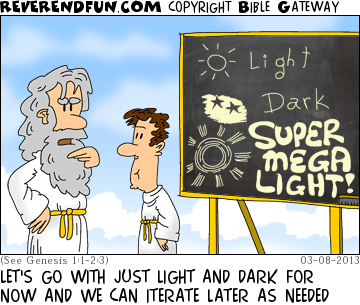BY THE END OF THE LESSON, WE WILL
IDENTIFY the misguided thinking and fear at work in the plan to build the tower of Babel; MEDITATE on our futile attempts to take control of situations that we don't fully understand, and SEEK guidance for the areas in which we have failed to recognize God's hand at work in our lives.FOCAL VERSES: GENESIS 11:1-9
KEEP IN MIND
"So the LORD scattered them abroad from thence upon the face of all earth: and they left off to build the city" (Genesis 11:8).AT-A-GLANCE
1. The People Exalt Themselves (Genesis 11:1-4)2. The Lord Brings Down the People (vv. 5-9)
IN FOCUS STORY
John was a single parent and life was difficult for him and his daughter. Most importantly, he hated that the only place he could afford to live was in a community where the school district was horrible. The crime rate at his daughter's high school was higher than its graduation rate. The schools on the south side were better. They had more resources and better books, and their students were not subjected to security measures to enter the building or attend a sporting event. John could not bear to hear any more of the stories Lauren told when she came home. After praying for a month with no change, John decided to take matters into his own hands. He found a nice, small house for himself and daughter. There, Lauren would be able to attend Southside High. It didn't matter that the rent was double what he paid on the west side; John could not afford to jeopardize Lauren's academic success. When his rental application was turned down because of poor credit, John cried. Didn't God care about his child's needs? John realized the answer to the question when, a month later, he heard the news of a pipe bomb explosion at Southside High School that fatally injured two students.
John could not bear to hear any more of the stories Lauren told when she came home. After praying for a month with no change, John decided to take matters into his own hands. He found a nice, small house for himself and daughter. There, Lauren would be able to attend Southside High. It didn't matter that the rent was double what he paid on the west side; John could not afford to jeopardize Lauren's academic success. When his rental application was turned down because of poor credit, John cried. Didn't God care about his child's needs? John realized the answer to the question when, a month later, he heard the news of a pipe bomb explosion at Southside High School that fatally injured two students. Sometimes God's way seem to confuse us, but His intent is always to protect us. In today's lesson, we learn that a failed attempt at something can be God's sovereign grace at work.
THE PEOPLE, PLACES, AND TIMES

 Brickmaking. Building in the ancient world were constructed using bricks made of claylike mixture of mud and straw. Scholars suggest that there were likely two ways of making brick. One way-the easiest-was to pack clay into a mold and let it dry in the sun. The Hebrews probably used this method in Egypt and later in the Promised Land. But the Babylonian method was more advanced-they used kilns to make their brick harder and more durable. Their were also larger and flatter, so they could support more weight. It was probably the Babylonian's ancestors who built the tower of Babel.
Brickmaking. Building in the ancient world were constructed using bricks made of claylike mixture of mud and straw. Scholars suggest that there were likely two ways of making brick. One way-the easiest-was to pack clay into a mold and let it dry in the sun. The Hebrews probably used this method in Egypt and later in the Promised Land. But the Babylonian method was more advanced-they used kilns to make their brick harder and more durable. Their were also larger and flatter, so they could support more weight. It was probably the Babylonian's ancestors who built the tower of Babel.  Shinar. Its name means "country of two rivers," as it was a tract of land
Shinar. Its name means "country of two rivers," as it was a tract of land between the Tigris and Euphrates Rivers. It is reported that Shinar was a plan country where brick was used for stone and slime for mortar. The country was later called Chaldea. Babel (Babylon) was its capital.
 Tower of Babel. Only mentioned once in the Bible, this tower was built of brick and slime. It is reported that it had the shape of a pyramid and was built in seven receding stages. The first, second, and third stories were twenty-six feet high, and the other four were sixteen feet. Scholars assert that there may have been a fifteen-foot ark or tabernacle on the seventh story, nearly covering it. The entire height of the tower, with the three-foot platform (to support its weight and height), would have been 160 feet, but without the platform, 157 feet.
Tower of Babel. Only mentioned once in the Bible, this tower was built of brick and slime. It is reported that it had the shape of a pyramid and was built in seven receding stages. The first, second, and third stories were twenty-six feet high, and the other four were sixteen feet. Scholars assert that there may have been a fifteen-foot ark or tabernacle on the seventh story, nearly covering it. The entire height of the tower, with the three-foot platform (to support its weight and height), would have been 160 feet, but without the platform, 157 feet. BACKGROUND
Genesis 9 closes the curtain on Noah's life, letting us know he lived 350 years after the Flood. One may be tempted to skip over Genesis 10, as it appears to be another long genealogical account of names and places. But Genesis 10 sets the stage for the rest of the book's chapters. Its shows us how God repopulated the earth, tell us who the main characters are and the roles they'll play, and unfolds God's plan for all people of the world. In our lesson text, we see how God carried the Gospel to all the world by scattering a bold group of people.SEARCH THE SCRIPTURES
1. What did the people say to one another (Genesis 11:3-4)?2. What were the people trying to do (v. 4)?
3. How did God respond to their work (vv.7-9)?
DISCUSS THE MEANING
1. Why didn't God choose another intervention to stop the people from building the tower? Why do you think He chose to give them different languages?2. Why did the people think that "making a name" for themselves would answer their fear? How do people in our society do this today?
3. What do you think about God using the very thing the people were afraid of as His judgment (i.e., v. 4 records that they were afraid of being scattered)?
4. In the In Focus story, John prayed "for a month with no change" and then asked the question: "Didn't God care about his child's needs?" The pipe bomb incident brought him out of his confusion. Have you ever been faced with a similar situation? What clarified God's response to you?
LESSON IN OUR SOCIETY
This text does not name the people who were causing this "fear of being scattered." What we do know is that they were not afraid of the One who could ultimately scatter them! Our society seems to have a similar misplaced fear. Despite the violence in communities, "don't snitch" has become the motto of the day. Parents cope with children who are afraid of being labeled "uncool" based on clothing or electronics. For fear of gang rejection, youths prefer jail to college. For fear of ridicule, people join bullies rather than protecting the bullied. Families fear that a child will be put off the team for missing Sunday practice, so they miss Sunday School instead. Why does our society seem to fear people they barely know rather than fearing God, who has their best interest in mind? What can the Apostolic Church do to help instill a vision for God?MAKE IT HAPPEN
Are you confused about why your actions aren't getting you anywhere? Perhaps you are overstepping your bounds, living beyond your means, or taking matters into your own hands. Sometimes ego and peer pressure, rather than God's voice, cause us to do things that lack God's wisdom. If this is your challenge, get help this week by prayerfully seeking a credit counseling agency or a professional in the areas where you need help in order to get the help you need. Consider talking to your pastor, a licensed Christian counselor, or another professional who can provide real resources and assistance to deal with your issue. Then trust God to make a real difference.(Except from The Apostolic Light)
DO YOU NEED MORE WORD?
ONLINE SUNDAY SCHOOL LESSON brought to you by:
WWW. ANYMEETING.COM


















